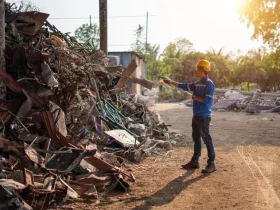As soon as you tackle a demolition project, it does not matter whether it is a large-scale teardown or small home renovation, because you will end up with considerable debris afterward. Demolition dumpster rental is a specialized service that will offer you a chance to deal with waste removal throughout the process.
The main idea is to secure the right type of dumpster, which will allow you to efficiently dispose of different demolition materials, from drywall and concrete to wood and shattered glass remnants. By clicking here, you will learn more about dealing with construction and demolition waste.
Getting the reliable and appropriate dumpster will not only help you handle the waste, but it is crucial for complying with environmental standards and local regulations. That is why choosing the best dumpster for your demolition involves understanding the type and size of waste involved in the project.
Renting a demolition dumpster can help you simplify the process of disposal and collection, meaning you can focus on task at hand without worrying about cleanup, which is vital to remember.
The rental process involves straightforward pricing, meaning the options come with various delivery schedules and sizes that will help you accommodate your specific budget constraints and timeline.
Customer support plays a crucial role in this particular service, meaning you will get guidance on best practices possible for information regarding service areas and loading dumpsters, which will help you ensure a hassle-free rental experience.
Things to Know About Dumpster Rental for Demolition

When you decide to rent a dumpster for a demolition project, you can rest assured, because the process of managing a substantial waste is effective and crucial process. This particular endeavor ensures that heavy debris from materials such as concrete, wood and asphalt is disposed of in efficient and safe manner.
We can differentiate various types of dumpsters you can find on the market for demolition waste, especially since the project requires dealing with a large volume of heavy materials that requires hauling. They generally come in different sizes, such as:
- 10-Yard – It is perfect for small-scale projects especially if you suffer from a limited space.
- 15-Yard – It is important for projects where you need more space, but still for limited project.
- 20-Yard – We are talking about versatile size for moderate projects.
- 30-Yard – You can rest assured and find option which is perfectly suitable for significant projects that require more waste.
- 40-Yard – Finally, you can choose such option, which is used for wide array of demolition projects available on the market.
Enter this site: https://www.epd.gov.hk/epd/misc/cdm/scheme.htm to learn more about this particular topic.
Choose the Right Size
When you wish to choose a dumpster, we recommend you to determine the scale of your project as well as types of materials involved in the process.
- Brick, Asphalt, and Concrete – These heavy materials require a concrete dumpster, which is sturdy and functional. At the same time, it requires more space than other options, meaning you should go for the largest size depending on your preferences.
- Wood and Drywall – As you probably understand, these materials are lighter, but often bulky, meaning you should get a large construction dumpster to handle the amount included.
We recommend you to avoid overage charges, especially if you get material-specific dumpster. Instead, you should talk with a rental company, because they can offer you with comprehensive insights on the volume and weight of the debris.
Applications
Generally, a demolition project can range from a small residential remodeling to a complete building teardown. You should understand certain points, which can help you throughout the process:
- Space and Accessibility – In case you are dealing with a constrained space, you should remember that a smaller dumpster is more practical solution.
- Heavy Duty Cleanup – The main idea is to ensure the chosen size can handle the weight of dirt, concrete and brick, which are commonly found in demolition sites.
If you wish to handle large-scale demolitions, we recommend you to find a dumpster that will match the scale of your project, especially if you have in mind that it generated heavy debris.
Things to Know Before Renting Dumpster
Before you decide to rent a dumpster, you should understand a few factors that will help you determine the best course of action, including prohibited items, permits and many more. That way, you can prepare properly and understand how to prepare for smooth renal process.
- Project Scope – The main idea is to estimate the type of debris and the amount your project will generate. That way, you can choose the appropriate size based on the project you have, which will prevent potential overfilling and paying more altogether.
- Weight Limits – Dumpsters generally feature weight limits based on size. For instance, when you decide to get 20-yard dumpster, you can use it for seven tons. At the same time, most rentals feature the first three tons in the rental fee, while the additional amount will end up more expensive.
- Required Permits – Everything depends on where the dumpster will be placed, but you may need to get a permit for the process. You do not need one for residential purposes, but placing it on a public property or street requires a thorough permit. We recommend you to check out local regulations on permit requirements, which will offer you a peace of mind.
Prohibited Items
It is vital to remember that certain materials are not allowed when choosing Dumpster Rental, meaning you should check out which items are prohibited and those that are not. Generally, you must think about following items and specify that you will throw them out, where the contractor should give you reliable dumpster for the type of materials you wish to throw away.
Prohibited items for most contractors include:
- Anything that features oil, propane or other flammable materials
- Asbestos, car batteries and tires
- Adhesives, lacquers, paint and solvents
- Household chemicals and cleaners
- Hazardous waste including corrosive, flammable, toxic, reactive and biohazard waste
- Any item that features refrigerants and freons
- Solid and heavy materials such as metal drums, water heaters, bathtubs, shelving, appliances, rims, automotive or farm parts
- Asphalt, roof tiles and concrete, because you must order a specific dumpster for these products
- Telephone poles and railroad tires












